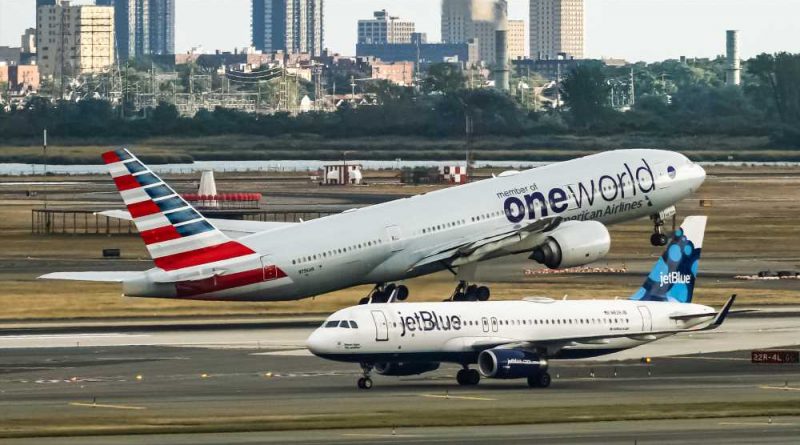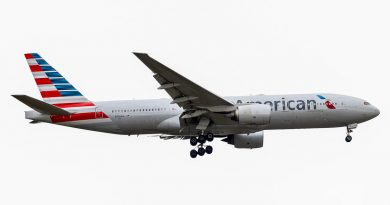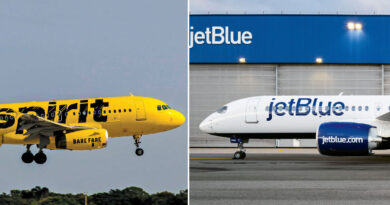Justice Department lawsuit threatens to break up American-JetBlue alliance
The Justice Department — alongside the District of Columbia and the states of Arizona, Massachusetts, California, Florida, Pennsylvania and Virginia — has sued American Airlines and JetBlue in an effort to break up the carriers’ new Northeast Alliance (NEA) in Boston and the New York area.
The alliance, the Justice Department and the other plaintiffs argue in the antitrust case, is anti-competitive, will cause hundreds of millions of dollars in harm to consumers and gives JetBlue incentive to subordinate itself to its larger partner on route decisions not only in New York and Boston but throughout its network.
The carriers quickly disputed the DOJ’s allegations in statements Tuesday afternoon, arguing that the alliance, which began in February, has already enabled new routes and beefed up frequencies through Newark, LaGuardia, JFK and Boston airports.
“Before the alliance, Delta and United dominated the New York City market,” American CEO Doug Parker said. “The NEA has created a third, full-scale competitor in New York and is empowering more growth in Boston. Ironically, the Department of Justice’s lawsuit seeks to take away consumer choice and inhibit competition, not encourage it. This is not a merger: American and JetBlue are, and will remain, independent airlines.”
JetBlue defends alliance
JetBlue CEO Robin Hayes said that the alliance has freed JetBlue to grow in the capacity-constrained New York market by giving it access to American-controlled departure and landing slots.
“The irony now is that the government agency responsible for preserving competition is instead trying to take away our ability to further expand our low fares in these markets,” Hayes said.
He added that since the onset of the alliance, JetBlue has announced nine new cities and 32 new routes, all of which were made possible by access to American’s landing slots as well as access to American’s customer base.
Parker said that cumulatively the Northeast Alliance has brought 58 new routes to Boston and the New York area, including new or planned JFK service to Tel Aviv, Athens and Delhi. The alliance has also increased frequencies on more than 130 routes and now includes codeshares on 175 routes, he added.
• Related: DOT may re-examine its approval of American-JetBlue alliance
The DOT approved the Northeast Alliance during the waning days of the Trump administration. Along with codesharing, the approval authorized the carriers to jointly schedule flights out of Boston and the three New York metro airports, though they aren’t allowed to collaborate on fares.
In the lawsuit, the DOJ alleges that on flights to and from those airports, JetBlue and American “have quietly agreed to share their revenues and coordinate which routes to fly, when to fly them, who will fly them and what size planes to use.”
Such tight coordination, the suit says, has a particularly strong impact on competition within the already consolidated U.S. airline industry ,since two-thirds of JetBlue’s business touches either New York or Boston.
The plaintiffs also state the American has long been a proponent of industry consolidation and noted that the carrier had fallen behind JetBlue in Boston. As such, they say, American “now seeks to co-opt JetBlue through an unprecedented domestic alliance.” They compare the alliance to the international joint venture tie-ups that have had the effect of consolidating the transatlantic aviation marketplace.
• Related: Impact of AA-JetBlue alliance not clear yet
“By effectively absorbing JetBlue’s operations in Boston and New York City, American can reduce investments not just in those cities but also in other parts of its network where it otherwise would maintain or add service,” the suit says. “As a consequence, consumers across the country will have fewer options and pay higher fares. In addition, by tying JetBlue’s success to that of American, the Northeast Alliance will significantly dampen JetBlue’s incentive to continue to compete with its much larger partner.”
As an example, the suit sights JetBlue’s new London service from New York and planned service from Boston as well as its larger ambitions to serve mainland Europe.
Though those flights are excluded from the alliance, the DOJ argues that JetBlue has less of an incentive to compete vigorously with American in the transatlantic marketplace from the Northeast because it shares revenue from American transatlantic routes that are part of the alliance.
Parker countered those allegations in an interview Tuesday afternoon with Washington Post Live.
“Nothing in the arrangement would not have us be vigorous competitors elsewhere,” he said.
Source: Read Full Article





